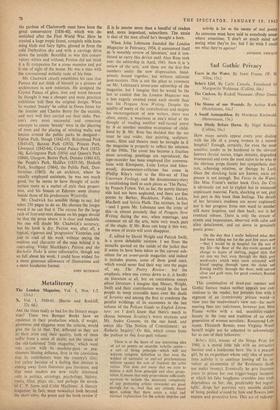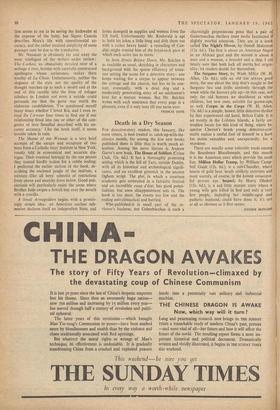Sad Gothic Privacy
Bebo's Girl, By Carlo Cassola. Translated by Marguerite Waldman. (Collins, 16s.) The Shame of our Wounds. By Arthur Roth. (Hutchinson, 16s.J A Small Armageddon. By Mordecai Roshwald. (Heinemann, 15s.)
Seen Dimly Before Dawn. By Nigel Balchin. (Collins, I6s.) How many novels appear every year dealing with the life of a young woman in a mental hospital? Enough, certainly, for even the most sensitive reader to be hardened to the obvious horrors (brutal nurses, tragic inmates, degrading treatments) and even the most naive to be wise to the obvious props (lonely but sympathetic doc- tors, scheming relatives, or therapy by Luv). Once the shocking facts are known, mere ex- posure is not enough. But Faces in the Water, like Miss Frame's earlier book Owls Do Cry, is obviously out not to exploit but to transcend unpleasant material. Facts, shocking or not, play less part in this book than feelings. The details of her heroine's madness are never explained; nor is her progress from one ward to another still more hopeless, and then back; nor is her eventual release. There is only the stream of events and impressions, observed with calm and alien detachment, and set down in genuinely poetic prose: On the day that I really believed what they had been telling me for the past few years now —that I would be in hospital for the rest of my life—the floor of the day-room seemed to change to layers of shifting, jagged slate that cut into my feet, even through the thick grey ward-socks which were soon saturated with blood seeping through upon the slates and flowing swiftly through the door, with cut-out silver and gold stars, for good conduct, floating upon it.
This combination of dead-pan manner and Gothic fantasy makes neither appeals nor con- cessions to the reader, but presents him with a segment of an irretrievably private world--a view into the madwoman's view out—far more moving than any indictment, however just. Miss Frame writes with a sad, sensibility-ridden beauty in the tone and tradition of an older generation of women novelists: Rosamond Leh- mann, Elizabeth Bowen, even Virginia Woolf herself might not be ashamed to acknowledge her as one of their followers.
Bebo's Girl, winner of the Strega Prize for 1960, is a moral little tale with an attractive heroine and a loathsome hero. She is a peasant girl, he an ex-partisan whose only idea of peace- time activity is to continue loosing off his re- volver at ex-enemies of the Resistance (both are under twenty). Eventually he gets fourteen years in prison for one trigger-happy incident, at which his fake toughness crumbles into total dependence on her; she, predictably but regret- tably, drops her previous very sensible dislike of being pushed around by him and flowers into mature and protective love. This act of redempa tion seems to me to be saving the bathwater at the expense of the baby, but Signor Cassola describes Mara's life with unsentimental ac- curacy, and the rather strained simplicity of some passages may be due to the translation.
Mr. Nassauer is obviously far and away the most intelligent of the writers under review: The Cuckoo, an obsessively detailed recit of a ménage a trois, bristles with carefully constructed apothegms whose seriousness makes them worthy of La Chute. Unfortunately, neither the elegance of the style nor the quality of the thought matches up to such a model and at the end of this ramble into the lives of refugee scholars in London not even a suicide could persuade me that the game was worth the elaborate candelabrum. 'I've questioned myself many times whether I loved Ria, and I even re- read De !'Amour four times to find out if our relationship fitted into one or other of the cate- gories of love Stendhal described with his un- canny accuracy.' Like the book itself, it seems trouble taken in vain.
The Shame of our Wounds is a very brief account of the escape and recapture of two boys from a Catholic boys' institute in New York, mostly told in economical and accurate dia- logue. Their eventual betrayal by the one person they trusted hardly n-.akes for a subtle ending; I preferred the earlier section of the book, de- scribing the enclosed jungle of the institute, a mixture (like all boys' schools) of restrictions from above and anarchy from below. Good anti- clericals will particularly enjoy the scene where Brother Jude swipes a Jewish boy over the mouth with a crucifix.
A Small Armageddon begins with a promis- ingly simple idea: an American nuclear sub- marine declares itself an independent State, and levies danegeld in supplies and women from the US itself. Unfortunately Mr. Roshwald is apt to hold his jokes a little long and dish them out with a rather heavy hand: a rereading of Can- dide might remind him of the breakneck pace at which such satire has to move.
In Seen Dimly Before Dawn, Mr. Balchin is, as readable as usual, sketching in characters and background with the sparse efficiency of some- one setting the scene for a detective story: one keeps waiting for a corpse to appear between the cottage and the church, but has to be con- tent, eventually, with a dead dog and a moderately penetrating story of an adolescent's love for a mature woman. But Mr. Balchin writes with such assurance that every page is a pleasure, even if it only lasts till one turns over.
FRANCIS HOPE



































 Previous page
Previous page